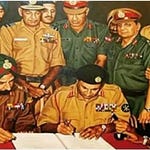A version of this essay was published by firstpost.com at https://www.firstpost.com/opinion/india-is-standing-up-and-defending-itself-but-is-uncle-sam-taking-note-of-it-10565421.html
On the face of it, Indian Minister of External Affairs S Jaishankar’s blunt responses to US pressure to toe its line regarding Ukraine are appropriate rebuttals to interference in India’s internal affairs. Because India has generally been reticent (for example in the face of aggressive Chinese statements), the general public has been delighted to see these as an example of a maturing of Indian resolve. I am not so sure.
I have long advocated mutually respectful US-India ties. And I was delighted by the promise of the Quad as a coming together of democratic forces in the Indo-Pacific, especially as an antidote to the rampaging Chinese. However, I was apprehensive about the Biden Administration, because the track record of the Democrats towards India is, well, abysmal.
In previous Democratic Administrations we had the spectacle of Madeleine Albright lecturing India rudely, and the dependably noxious Robin Raphel who was later accused by the FBI of being a Pakistani agent (she was cleared of those charges). The general tendency has been to treat India with disdain, if not contempt, partly as a vestige of Cold War attitudes, the silly Non-Aligned Movement, and inane moralizing by the likes of Nehru and Krishna Menon.
Besides, India was seen as a basket-case (with good reason: humiliating PL 480 emergency food aid was a defining moment, because Indians ate only when US ships showed up with grain that they would normally only feed to livestock). A country that cannot manage its basic food security deserves disdain. But those days are long gone, except in the minds of Atlanticist Cold Warriors: India is now one of the biggest exporters of grain, and will profit from the Ukraine war.
In other ways, too, the power equation between the two countries needs to be re-thought. I am reminded of the story of the court poet of a king in India who wrote a poem comparing his king to the Emperor. He called his king the New Moon and the Emperor the Full Moon. Furious, the king wanted to know why he said that.
The poet explained that the New Moon is waxing, and the Full Moon is waning.
In a nutshell, that is the situation with India and the US. Barring some unforeseen calamities, relative Indian economic and military might is going to increase, and America’s is going to decrease. In the not too distant future, India’s GDP in PPP terms will exceed that of the US, and it is a matter of speculation when the GDP in nominal terms also does the same. This is not jingoistic chest-thumping, but a very real possibility.
The US is suffering from something like a midlife crisis. That is odd, for a nation with immense endowment – a vast continent with all the natural resources one could possibly want – and blessed with friendly neighbors and vast oceans separating it from possible foes. Its people have long been the most industrious and most innovative on earth, and the country is a magnet for the best and brightest from all over the world. Its soft power, too, is unrivaled.
Yet, the prevailing concerns that animate Americans seem odd: gender, abortion rights, human rights. They are not exercised over their virtual de-industrialization (and the loss of manufacturing jobs) courtesy China, nor the possible collapse in white collar jobs through automation and robotics.
They seem blase about their profligate use of energy (NPR reported in “How much energy powers a good life?” a Stanford study that Americans use “nearly four times the energy needed to live a happy life”). This is clearly driving global climate change.
They may well be living beyond their means, propped up by printing billions of dollars, which they can do because Nixon took the dollar off the gold standard. The dollar remains the global reserve currency. However, the sanctions against Russia may well result in the bifurcation of the global trading system, and the Chinese would love to make the renminbi the currency of choice.
Yet, Americans are mostly worried about human rights. Granted, these are ethical issues that are the proper concern of rich countries, but there is a whiff of decadence: it feels like the self-absorbed navel-gazing of a civilization in decline, oblivious to the barbarians at the gates, and you know who said barbarians are. The word degringolade seems to sum it up: the possibility of sudden collapse.
The further problem is that they are lecturing others when their own system is not exactly functioning that well. The US Secretary of State Anthony Blinken injected a sour note into the recent 2+2 meeting with India when he said, gratuitously, that “human rights abuses” in India were being monitored by the US.
It was ironic that Blinken made this statement on a day when somebody shot up 10 people in Brooklyn; the next day two Sikhs were beaten and robbed in New York City. And a Kashmiri Hindu was shot dead in Kashmir. The NY Times, in the wake of a fatal shooting of a black man by a police officer, said: “American police officers, over the previous five years, have killed more than 400 motorists who were not wielding a gun or knife or under pursuit for a violent crime."
One could argue that human rights abuses are a problem for the US, too. The Chinese make the US squirm by listing instances. At a function (at Howard University, a historically black university), MEA Jaishankar said that India is paying attention to human rights issues in the US. He also talked about the threat of CAATSA sanctions on India, and in effect said that if the US were to impose those sanctions, India would find a way around them.
Indeed, India did get around earlier American denials and sanctions: when it went nuclear, earlier when the US unilaterally repealed the treaty about supplying nuclear fuel to Tarapore, when the Biden Amendment (yes, same Biden) forced Russia to renege on its cryogenic rocket engine deal with India, and when a Cray supercomputer sale was canceled.
So far, so good. Yes, India is standing up and defending itself. But the question is whether this is registering where it counts. The Indian media is agog with reports. However, the American media, so far as I can tell, didn’t report on this: which means that official America simply did not hear the retort by the Indian MEA.
Furthermore, there is the Good Cop, Bad Cop story: Deputy National Security Advisor Daleep Singh threatened India with “consequences”. An emollient Daniel Lu, a senior State Department official, made soothing noises. Victoria Nuland, the architect of the ‘Maidan Revolution’ in Ukraine in 2014, visited, and met with mysterious “thought leaders” and with Arvind Kejriwal.
Shortly thereafter, the AAP government in Punjab demanded 50,000 crores a year from the Center to fulfill AAP’s own grandiose election promises of freebies; Mamata Banerjee in West Bengal casually dismissed the rape-murder of a 14-year-old Hindu girl by TMC cadres; the Tamil Nadu government ratcheted up separatist noises; and Ram Navami and Hanuman Jayanti shobhayatras were attacked with stone-pelting by Muslims. Pure coincidence? Or “consequences”?
Is the Biden Administration now convinced that India will, and should be allowed to, pursue its own interests? I am just not so sure as others are. After all, I hear AUKUS is becoming JAUKUS (pronounced “jackass”), and that leaves India out in the cold clutching the Quad.
1247 words, April 14, 2022 updated April 17, 2022














Share this post